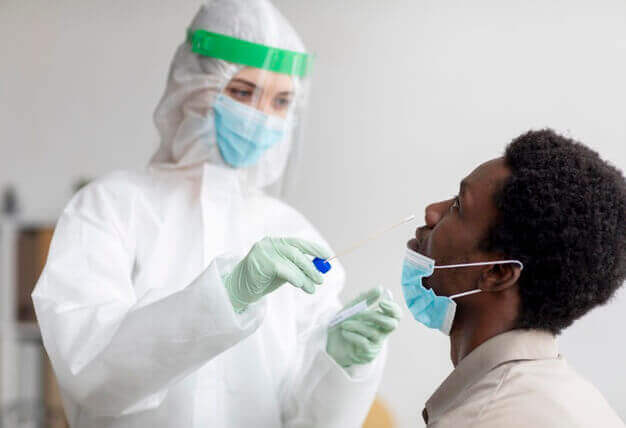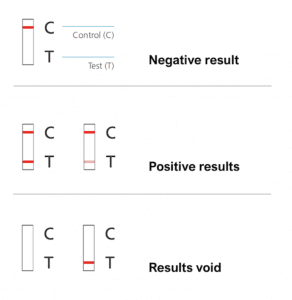
Routine, high-quality testing in workplaces helps provide confidence and clarity to both employers and employees alike.
As you’ll be aware, the creation of a large-scale programme of testing and tracing is well underway in the UK. It has been designed to help us lift some of the COVID-19 restrictions that have been put in place, and to slowly restore our economy and society.
In addition to the NHS-backed testing initiative, many employers have chosen to introduce their own internal testing programmes. While it’s a completely voluntary decision for employers to run their own testing programmes, they can provide confidence to both workers and customers if done right, and may help to protect the business and allow it to continue running throughout the pandemic.
If you’re an employer considering running your own testing programme, we’ve put together all the guidance from official government and healthcare sources to cover:
Although we’ve put together this guide based on advice and information available at the time of writing, you should always double check it with current guidance from the government which may be more up to date.
Testing for COVID-19 is important for science, medicine, and public health. It helps detect people who currently have a SARS-CoV-2 infection, even those who don’t show any symptoms (i.e., those who are asymptomatic), so that they can self-isolate and prevent spreading it around to others.
COVID-19 testing can also be used for ‘contact tracing’ of potentially exposed individuals so they can be vigilant and change their behaviour if necessary, for example by going into self-isolation.
Testing information is also crucial for monitoring the number of people who are infected in a population. This helps the government and health agencies make public health decisions about what measures to put in place to contain the virus, drive down cases, and consequently save lives.
There are two main types of COVID-19 test available.
The most widely used type of COVID-19 test is the PCR test.
PCR is an established and highly accurate scientific technique. It is a very sensitive test that’s able to detect very low levels of genetic material in a sample. Despite this accuracy, PCR tests can still give false negative results between 2% and 29% of the time.
PCR tests work by taking a swab sample from a patient’s nose and throat. This is usually done by a doctor, nurse, or other qualified health professional. The sample is then sent off to a lab for analysis.
With PCR testing, samples need to be taken within a week after a person has first been infected, even if a patient is asymptomatic. This is because samples collected are only useful during an active SARS-CoV-2 infection.
Once an infection has cleared, PCR can’t be used and it won’t tell you if you’ve been previously infected. This is because once an infection is over, viral generic material is no longer present in the body.
While PCR was for a while the only test available, the government has given the green light for individuals to use a select few ‘brands’ of lateral flow COVID-19 for self-testing purposes. These can also be acquired by employers and used to test asymptomatic employees.
Lateral flow COVID-19 tests play a different but still crucial role in the fight against COVID-19.
This is because lateral flow COVID-19 antigen tests can be used to reliably test asymptomatic individuals who do not display any symptoms. Currently, it’s estimated that 1 in 3 people have COVID-19 while asymptomatic, and thus they aren’t aware that they do. This means that they’re able to unwittingly spread the virus around.
Tests like the Healgen COVID-19 rapid antigen testing kit we sell here at HandStations help to find asymptomatic cases earlier and break the hidden chains of transmission.
Healgen antigen test are approved for public use by both the UK government and Public Health England, and each kit contains everything that’s needed to carry out the test, including clear instructions. Results are available in as little as 15 minutes, allowing for quick testing and decisive action to help curb the spread of the virus in workplaces.
If any of your employees are displaying any of the symptoms of COVID-19, they should self-isolate immediately and contact the NHS to arrange a COVID-19 PCR test. You should not encourage symptomatic employees to come to the workplace to be tested with a lateral flow kit.
Lateral flow isn’t new; it’s a well-established and understood scientific technology that detects antigens which are present when somebody has an active case of COVID-19. One of the more known types of lateral flow test is the home pregnancy kit.
Lateral test kits are hand-held devices with a pad at one end and a results reading window at the other. Located inside of the device is a small piece of test paper that changes colour depending on what’s present in the substance being tested (i.e., COVID-19 antigens.)

POSITIVE COVID-19 RESULT: The presence of two lines as control line (C) and test line (T) indicates a positive COVID-19 test result. This is true even if one of the lines is faint or barely visible.
NEGATIVE COVID-19 RESULT: The presence of only the control line (C) indicates a negative COVID-19 test result.
VOID RESULT: If there is no control line (C) after performing the test, the result is invalid. This is the case even if there’s a test line (T). Another test should be carried out.
Lateral flow tests, when used correctly, can be effective at helping to reduce the spread of COVID-19 by identifying asymptomatic cases that would have otherwise gone unnoticed and potentially spread. They can deliver rapid results in as little as 15-30 minutes, helping to quickly identify and prevent further infections.
The COVID-19 antigen tests that have been approved by the UK government—including the Coronavirus Antigen Rapid Test sold by HandStations—have gone through rigorous evaluations by some of the UK’s leading scientists, healthcare officials, and experts.
This means that they’re accurate, reliable, and successfully identify COVID-19 cases where the infected individual is not showing symptoms. This means that they could help save lives.
The fight against COVID-19 is very much a collective effort. We’ve all got to do our part to help reduce transmission, cases, and deaths. Doing so will help us get back to normality sooner rather than later and enable our economy and country to recover.
Lateral flow tests are very practical, easy to administer and interpret, and can be used in a wide range of settings, including workplaces.
Clinical evaluation by Public Health England (PHE) and Oxford University shows that the tests perform best when levels of virus are at their highest. Thousands of positive COVID-19 cases have already been detected using these tests.
Each positive case that is identified can help prevent many additional people becoming infected over time.
As testing technology and COVID-19 test kits become more widespread and available, many employers will want to test their employees on a regular basis.
This is general guidance for testing asymptomatic employees. It is not for employees seeking to test people with COVID-19 symptoms. Employees with symptoms should book a test through NHS Test & Trace.
When deciding on how often to test employees, you should consider:
Although antigen testing is a useful tool, it should not be used as a replacement measure. It’s a complementary tool designed to stop the spread of the virus by detecting asymptomatic cases. Carrying out testing does not mean you can let other COVID measures and controls fall by the wayside.
The UK government has produced guidance on how to work safely during coronavirus. Measures listed here include good hand hygiene, social distancing, ventilation, and more. We’ve also published a range of useful resources which you can read on our blog:
Test results are personal and highly sensitive data concerning the health situation of your employees. As such, they should be handled professionally and with utmost care.
Employers can in some cases receive the results of their employees’ tests. To get access, however, they need appropriate grounds for lawful processing as per the GDPR. More information about this can be found on the Information Commissioner website.
While antigen tests will provide a quick result, official processing of the test needs to be done by a healthcare professional or somebody with an equivalent duty of confidentiality.
The UK government recommends that employers work with third-party healthcare providers to establish a suitable and lawful framework for testing employees and processing results.
If employees test positive, regardless of where or how they were tested, they are legally required to immediately self-isolate for 10 days. Any people in the employee’s household and any other close contacts, including work colleagues who have come into contact with them, will also need to self-isolate for a period of 14 days.
There is a legal requirement for all medical practitioners or diagnostic laboratories to report confirmatory positive results of COVID-19 tests.
It’s therefore imperative that you have arrangements in place to report positive tests to Public Health England (PHE) to meet the legal requirements on notifying PHE. This is another reason why it’s recommended that employers work with third-party healthcare providers to set up a suitable testing and reporting framework.
Regardless of a test result, if an employee has symptoms such as a high temperature, a new continuous cough, or a loss or change to sense of smell or taste, they should self-isolate for 10 days. This is the case even if a rest result is negative or if you’re waiting for results.
An antibody test is different to an antigen test. While an antigen test can report if somebody currently has the virus, an antibody test reports if somebody has previously been infected with SARS-CoV-2. This is because antibodies are produced by the immune system when someone has had an infection.
Accurate antibody tests have now been developed and are widely used across the NHS. They are also available privately.
A positive antibody test will reveal whether somebody has had the virus previously, not if they currently have it.
Because it’s currently not known whether being infected in the past makes a person immune and prevents them from catching SARS-CoV-2 again, antibody tests aren’t usually going to be the right choice for employers. Knowing whether somebody has had the virus does very little to help your decision making because even if somebody has had it, you still need to follow guidance on social distancing and other measures.
Testing is a complementary measure; it’s not intended to replace things like social distancing and regular hand washing. Even if you implement a testing strategy, you’re still going to have to enforce the full range of COVID-19 measures in your workplace.
It’s a good idea for employers to update their risk assessments to account for COVID-19 and the risks that come with it to their staff, premises, and wider operations. Doing so will help paint a clearer picture and aid leaders in their understanding of what needs to be done to protect staff. A COVID-19 risk assessment should:
As an employer, you are required by law to take steps to protect your workers from COVID-19. Since the virus can transfer between people and from surfaces to people, it’s imperative that workplaces are kept clean and sanitised at all times. This means that many businesses have had to change and adapt their hygiene procedures.
The most important thing you can do as an employer is promote regular handwashing and hand sanitising. This can be done through official company policies, signs, posters, and educational material. It also helps if there are plenty of opportunities for workers to actually wash or sanitise their hands.
This is where hand sanitiser dispensers come in. You can learn more about these below:
As we’ve been told all throughout the pandemic, the best way to fight the spread of the virus is to stay at home. The more you stay home, the fewer people you come into contact with. This is why the government has encouraged businesses to enable home working wherever possible.
Unless it’s absolutely crucial that your employees work from your office or workspace, you should allow them to work from home and provide the equipment necessary to do this, such as computers, phones, and videoconferencing facilities.
In your workspace, consider enforcing social distancing by:
A huge part of stopping the spread of COVID-19 is good hand hygiene, and that’s why we provide a large range of hand hygiene products ideal for the workplace, no matter if it’s an office, shop, or restaurant.
Read our blog for more resources or visit our online shop. You can also buy Healgen COVID-19 antigen tests in boxes of 20.
Emir Limam – E11 Group B.V. Netherlands – Fraudster
24 May 2023When to Take a Test After Covid Exposure?
30 January 2023A Rapid Antigen Test vs a Lateral Flow Test for Covid-19
30 January 2023